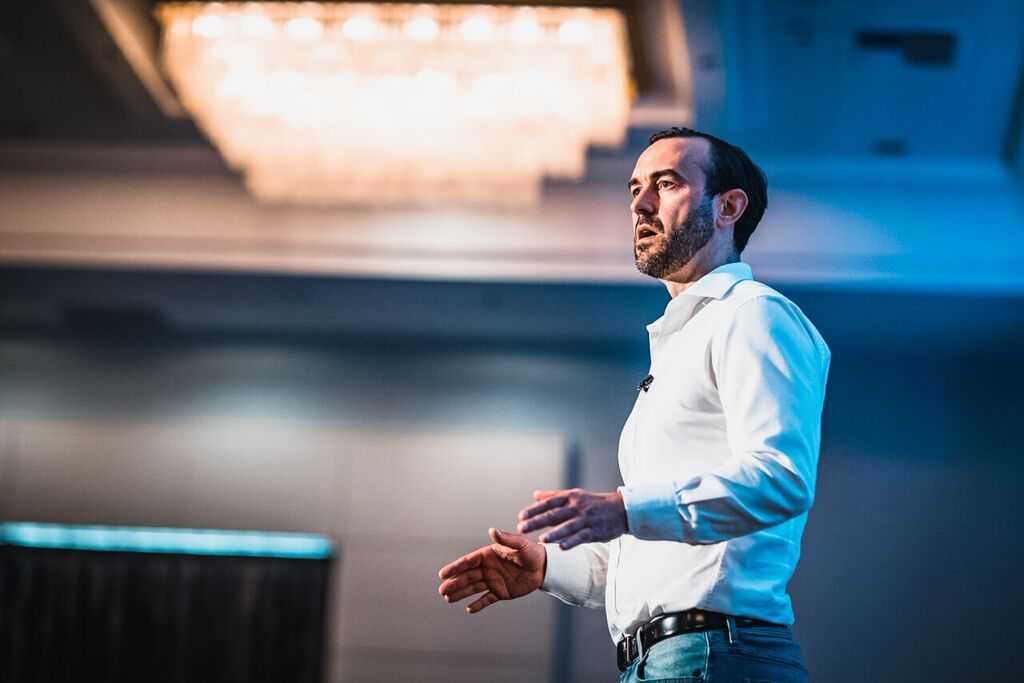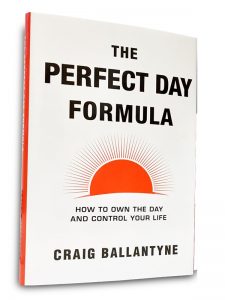My New Rules of Living

Have you ever had an idea that led to a life-changing decision? Something that seemingly came out of nowhere, but now seems so obvious and important in hindsight?
This happened to me and, as a result, it changed my career. This one out-of-the-blue insight laid the foundation for my first book—“The Perfect Day Formula.”
I can’t remember what exactly sparked me to do this, but after lunch on Easter Sunday of 2011, I sat down and wrote one of the most important articles of my life.
You could say it was much more than an article; it was more like a manifesto or a creed. It was my Magna Carta, my Declaration of Independence, my 12 Commandments.
The essay was called, fittingly, “12 Rules for Living.” In it, I shared my personal philosophy and taught you to develop your own. The purpose was simple; the self-defined rules would make right decisions automatic and allow us to live our lives without guilt, stress, or wasted emotional energy. We would, as a result, be on the fast track to success.
Still, many asked the question: “Why would I want more rules in my life?”
When government laws are forced on us—even for something as mundane as loitering or wearing a seatbelt—we resist. Why? Because we are rebellious in nature and don’t like the idea of others controlling our actions.
However, when we put rules into our own life around our behaviors, we can become highly effective and productive people.
You see, everyone goes through life using a certain set of guiding principles. These come from books that have influenced us, traditions passed down to us from our parents, our self-affirmed values, social experiences, and from personal explorations into what matters.
You already have rules, you’ve just never written them down. For better or for worse, we all have a set of operating principles that guide our decisions.
For example, some people have an unwritten mental rule that they always go to church on Sunday morning. Others have an unwritten rule that they always go to the bar after work on Friday. You can see how these subconscious rules can lead to success—or failure.
To further illustrate my point, think about the operating system of your phone or computer. The “rules” of this operating system allow it to do marvelous things, from FaceTiming a friend in France to mapping your way across a foreign city. You can even harness the power of this operating system to run a multi-million business, as many of my coaching clients do.
Now imagine building an equally powerful operating system for your life. You’d have greater clarity on what matters, what to do, and when to do it (and perhaps most importantly, what to stop doing). Results would come more quickly and more easily.
That’s what the Rules for Your Life are all about.
The value of having a “Rules to Live By operating system” has not diminished since I sat down and wrote mine years ago.
My article influenced many others to create their own rules, as I had hoped, but one common mistake kept popping up. Too many readers were creating an excessive number of rules.
In my original example, I listed 12 rules for myself. Looking back, a few were unnecessary, and didn’t even fit the within the scope of personal philosophy. Using this as a guide, many ETR readers created lists of 15 rules—and in some cases, even more.
But that defeats the purpose. It provides too many constraints and can easily overwhelm you. What’s more, you’ll likely face contradicting rules with lists that run on and on. How can you possible uphold all of them simultaneously?
That’s why I wrote this article simplifying the creation of the rules to a foundation of just seven rules to start.
Recently, after a podcast interview with ETR’s editor, Jeff Steen, I decided to go back and edit my list of rules to a tighter 10.
Here are the rules I’m cutting and why:
I do not check email before 11 a.m. I do not talk on the phone unless it is a scheduled interview or conference call.
This is no longer necessary. When I created the rule, email was a bad habit. It controlled me, rather than the other way around. Today, it doesn’t get in my way because I have built automatic habits that purge digital distractions. I have also been very clear about defining my daily priorities and time-blocking so that I have the focus I need to accomplish all of my goals—without being derailed by text messages or social media.
I will help 10 million men and women transform their lives.
This is a goal. It’s not a rule. It should never have been on my list in the first place. That said, many of rules have helped me push toward this goal by creating greater discipline and clarity.
#
Now that I’ve hacked off a couple of inappropriate “rules,” it’s time to rework the ones that got me started. The good news is, my operating system has not fundamentally changed—it just needs a few updates.
My New-ish 10 Rules
1. I go to bed and get up at the same time every day of the week (8 p.m. and 4 a.m.) I stick to my diet, avoid caffeine after 10 a.m., and avoid alcohol within three hours of bedtime.
(I adjusted the caffeine intake to end at 10 a.m. instead of 1 p.m. Following my 10-3-2-1-0 sleep system from “ThePerfect Day Formula” means I need to stop caffeine intake 10 or more hours before bed, and that meant 1 p.m. was too late.)
2. I write for at least 60 minutes first thing every morning.
(This rule eliminates the need for the email rule; early morning email impulses are no longer a danger because I’m focused on writing.)
3. I create a to-do list at the end of every workday and spend additional time in the evening updating my daily gratitude and achievement journal.
(This is a necessary carry-over from my original list of rules.)
4. I do not engage in confrontations with anyone, in-person or online. This is a waste of time and energy. If I have caused harm, I apologize and fix the situation. Then I take a deep breath, relax, breathe out, and re-focus my efforts back on my work and goals.
(Another necessary carry-over. You should have some form of this in your own list; it will save you a lot of time and energy.)
5. I am guided by these two phrases:
a) “Nothing matters.”—I can only work towards my major, massive goals and my vision for helping others. The opinions of others do not matter to my goals.
b) “It will all be over soon.”—The bad times will end and the good times will, too. Stay strong during the struggles and be present in the moments that matter.
(While not technically a new rule, this one has more meaning the more I experience life. It’s one I come back to time and time again.)
6. I accept that everything that happens to me—good and bad—is my personal responsibility. I blame no one but myself. These are the choices I’ve made and this is the life I’m living. I accept the consequences of my actions.
(Another necessary carry-over. You should have some form of this in your own list. It will save you a lot of time and energy.)
7. I act politely and courteously. I do not swear.
(My relationships have benefited tremendously from this rule and I have earned the respect of peers as a result. You can’t put a price tag on that respect, but I know that it’s elevated my status among many of my colleagues—many of whom find the simple act of not cursing to be impossible.)
8. I will not be the person I don’t want to be. I will not be petty, jealous, or envious, or give in to any other of those lazy emotions. I will not gossip or speak badly of others, no matter who I am with or what environment that I am in. I will not be negative when it is better to be positive. I will not hurt others when it is possible to help. I will know the temptations and environments in life that I must avoid, and I will avoid them, even if it means severing ties with those who “live” in those environments. It’s my life and that matters more than what other people think of me.
(Perhaps the most important of all my rules, this one remains the most aspirational on my list. I’m not perfect at it yet, but it reminds me to do better every day.)
9. “I will always keep the child within me alive.” —Ted Nicholas.
(This has been an ongoing project, as it is for everyone. It’s important to laugh and be silly from time to time. It also reminds me to play the role of “Uncle Craiggy” as much as possible when visiting my friends and their children.)
10. “I will write with honesty and feeling.” —Ted Nicholas. It is only through honesty that my advice and encouragement will bring change to those around me. People sense falsehood and will dismiss you because of it.
(Another necessary carry-over. It is this rule that allowed my to write my book and inspire millions of people through my life’s journey here at Early To Rise.)
#
If you are new to the idea of personal philosophy, I want you to write down your own Rules for Living. Start with the essential seven and give them time to sink in. Revisit your list and add more if you think it’s necessary, but keep your list to no more than 10. After all, if 10 Commandments was good enough for God, so 10 rules should be good enough for us. Besides, your rules are about empowerment, not constriction.
This is your “operating system,” built to keep you moving forward efficiently. Identify your biggest temptations and fashion a couple of aspirational rules around them that will encourage you to stay out of trouble. Over time, these will become automatic habits on your path to success.
If you already have your rules tucked away, pull them out and review them (at least once a year). Cut the fluff. Make edits to accommodate your current situation and goals. Utilize strong language as an impetus for leveling up. Be realistic, but push yourself to new heights.
With your and new improved “operating system” in place, success will come more quickly than ever before. It certainly has for me.
 Curious about the philosophies that helped me build my original 12 Rules? They are the same ones that I use today, and have been using for decades. They guide my mental, emotional, physical, and spiritual development on my path to ever-greater success.
Curious about the philosophies that helped me build my original 12 Rules? They are the same ones that I use today, and have been using for decades. They guide my mental, emotional, physical, and spiritual development on my path to ever-greater success.
And they’re all right here, in “The Perfect Day Formula.” Get your own copy for FREE and set a path to achievements you never thought possible.
